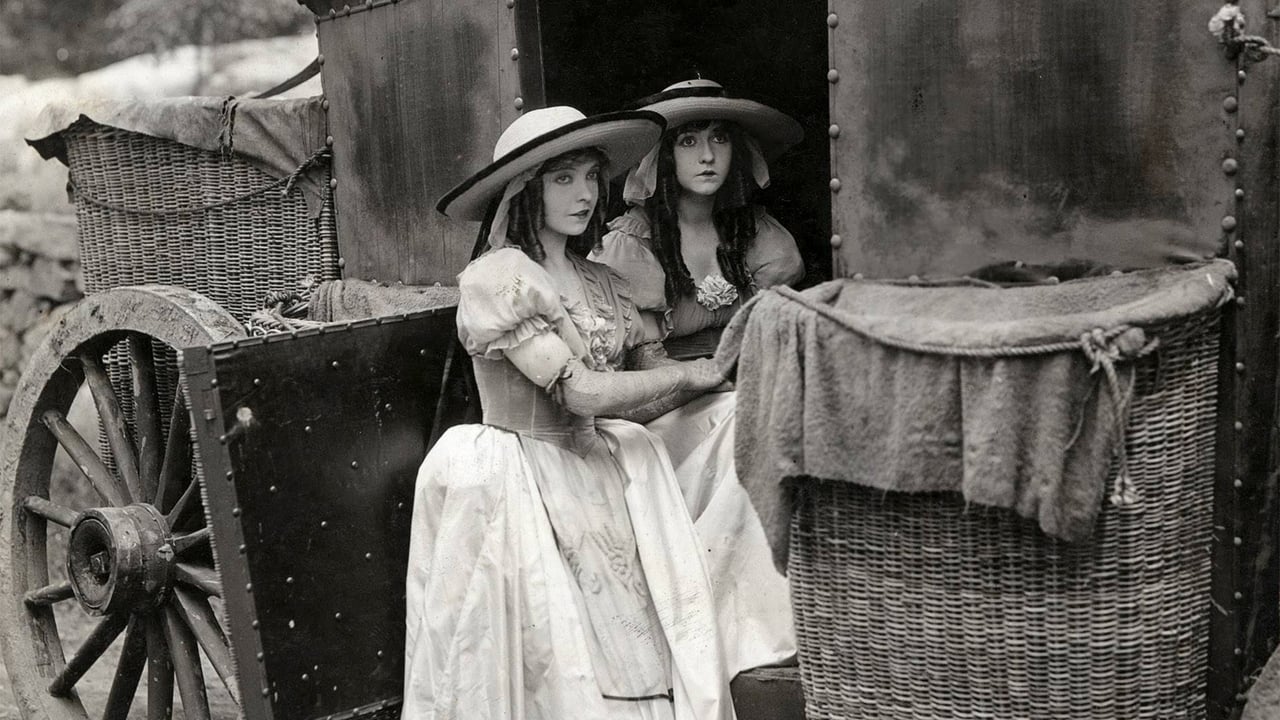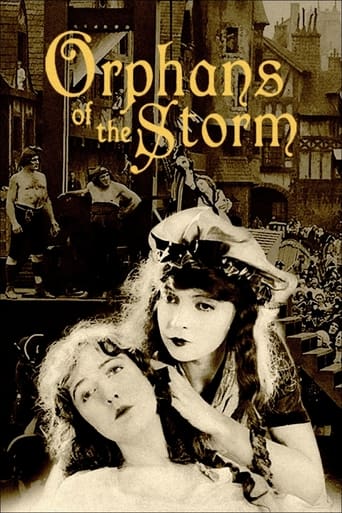Interesteg
What makes it different from others?
Softwing
Most undeservingly overhyped movie of all time??
Matialth
Good concept, poorly executed.
Melanie Bouvet
The movie's not perfect, but it sticks the landing of its message. It was engaging - thrilling at times - and I personally thought it was a great time.
Claudio Carvalho
In the Eighteenth Century in France, a few years before the French Revolution, the Countess de Linieres (Katherine Emmet) asks her minion to deliver her baby daughter Louise to an orphanage to protect her. However he leaves the baby on the stairs of a church. A peasant finds Louise and brings her home to his wife and they find a necklace with her name and money in the basket. They raise Louise with their daughter Henriette as sisters, but years later there is a plague and they die and Louise becomes blind. Louise Girard (Dorothy Gish) is totally dependent on Henriette Girard (Lillian Gish) and they travel to Paris expecting to find the cure of Louise's blindness. The rogue Marquis de Praille (Morgan Wallace) sees Henriette and becomes fascinated with her virginal beauty. He asks his men to abduct Henriette and brings her to his party. Louise is left alone in Paris and the scoundrel Mother Frochard (Lucille La Verne) forces Louise to beg on the streets for her. Meanwhile the noble aristocrat Chevalier de Vaudrey (Joseph Schildkraut) saves Henriette and they fall in love with each other. But Henriette explains that she had promised Louise that she would not marry until Louise could look upon her husband to approve him. Meanwhile Danton (Monte Blue), who is saved by Henriette, and Robespierre (Sidney Herbert) are plotting the French Revolution that explodes on the streets keeping the sisters apart."Orphans of the Storm" is another magnificent epic by D. W. Griffith and his last success. The film impresses in many aspects, such as the screenplay, the set locations and fantastic camera work, with impressive angles considering the size of the cameras and the technology in the early Twentieth Century. The plot is a combination of heavy drama, romance and action and sensitive viewers will certainly need a handkerchief to see the touching scenes of the sisters set apart. The suspenseful conclusion, with Danton and his men trying to deliver the pardon of Henriette and Chevalier de Vaudrey, is suspenseful and thrilling. The lovely Lilian Gish is another attraction with a wonderful performance. Last but not the least, "Orphans of the Storm" is a mandatory film for any cinema lover. My vote is nine.Title (Brazil): "Órfãs da Tempestade" ("Orphans of the Storm")
Tweekums
Set at the time of the French Revolution this film follows two women, Henriette and Louise who have been raised as sisters. A plague has killed their parents and left Louise blind so the head to Paris hoping to find a doctor who may cure her. Unfortunately things don't go according to plan; Henriette is snatched by people working for a lecherous aristocrat then Louise falls into the clutches of a spiteful hag who forces her to beg on the streets. Luckily for Henriette she is saved by the kind aristocrat Chevalier de Vaudrey; they set off to find Louise but they have made powerful enemies. When the revolution comes it looks as though life in France will get better but it isn't long before the callous aristocracy has been replaced by a new more brutal regime and it looks as if Henriette and Chevalier may fall victim to the guillotine!This film by G. W. Griffiths probably won't be watched by too many people as it is both monochromatic and silent; which is a pity as it really is rather good. I say monochromatic rather than black and white as the scenes are shown through different coloured filters; this serves to emphasise the atmosphere of each scene. I was surprised just how quickly I got used to the fact that I couldn't hear what the characters were saying; occasional inter-titles explained key points and the casts emoting was good enough to convey the meaning of what was being said.The way the story is told may seem a little melodramatic to modern viewers and it isn't subtle about telling us just who is good and who is bad… in one scene an aristocrats carriage runs over and kills a peasant and he is more concerned about his horses and Robespierre couldn't have been more villainous if he'd t been depicted stroking a white cat like Blofeld in a Bond film! This wasn't a problem though as the story moves along at a cracking pace. There is plenty of drama as well as a romantic subplot involving Henriette and Chevalier all of which leads to a fine ending; right up until the last moment I wasn't sure whether or not that couple would survive. The cast did a fine job; especially real life sisters Lillian and Dorothy Gish who play Henriette and Louise.Overall I'd certainly recommend this and not just to people fascinated by early cinema; the two and a half hour run time goes by faster than plenty of modern films!
bbrooks94
D.W. Griffith's monumental epic about two sisters swept up in 18th Century Paris before, during and after the French Revolution is a masterwork in storytelling, direction and social comment, with Griffith attacking both the nature of 'mob' and aristocratic rule. On both sides of the revolution there are unpleasant, greedy individuals bent on destruction. The story is touching, Griffith's use of colour filters a welcome touch to the atmosphere and scenes, which are crafted and composed to perfection. Costumes, sets and setpieces all look beautiful. There are dozens of characters, some real life figures, such as Robespierre or Danton, each one with a uniquely crafted personality and well performed. Lillian Gish is truly astounding. The story may indeed be riddled with clichés and dramatic coincidences, but Griffith edits the film so well that you admire these moments, rather than cringe at them. I know Griffith is essentially notorious for only one film, which has no doubt swiped a gaping scar across the rest of his career, but he truly was a master.
carvalheiro
"Orphans of the storm" (1921) directed by D.W.Griffith is one of the most important movies ever made in silent cinema, which took the French revolution as target of nowhere unhappiest disgrace to explain maybe by contagion the near happening of another revolution, like the Bolshevik, less obviously maybe and its uncontrolled terror of state mixed with defense motivation. Griffith was here in this movie in the plenitude of his strength as interpreter of a kind of unfortunate conception about evolution of Europe history, taking an option for the goodness to the losers, even if their relatives were responsible directly or indirectly for the state of hungry and the consequent disorganization for the supplies in that society, with the people's savings lost and surviving only with unrest in countryside namely. The style of editing close shots alternatively with some long shots and even the so-called American shots - that was and still is in the half figure subject by his or her chest - as though the variety of compositions and also its shapes inside for a photography made by his fellow Billy Bitzer it seems - but he was out of the credits giving his name to another cinematographer - and the style of a dramatic issue for the romantic story below the tragic events, put this movie still now at high level for an utmost and better context, for another answer to the problem of an issue for the revolution. Independently of the destiny of human beings but as the result of contradictions made by development and its bad distribution between humankind and the people, in splitting classes or in hierarchies against the production of means of wealthy. The story in itself comparing the children in the storm as orphans in between the adventure of their abandoned souls, when it was implanted the system of the three powers after the first big crisis of legitimacy of the ancient regime, because the kingdom absolutism without possible issue at short term in France, surely is the better moment of this movie. Just while in it the characters rolling the eyes round the sockets, as typical touch of the silent drama since Griffith particularly. Surely with the dissolution of customs within these families linked with the propriety of the soil, the owner each own with its heraldic condition, symbolizing strength and the mercy for such a couple of young girls, in a storm for their poor lives at mercy of circumstances as guillotine and Danton's help. Personally which seems an exaggeration from the story, as told by an aristocratic version of a more liberal and perfunctory conception of reflux from the historical movement since Thiers. It is thinkable that the scene with the crowd in exciting mood, with the impression of lack of pity for the convicted on the convoy, it made the matter of the emotions from the viewer, as the execution on the place before the people, in such an exaggeration from the skilled editing of the scene of excited crowd, in an overwhelming way of specific kind of agitation and insensitivity for the mortal ceremony. The strength of its expressively beauty for which it was told also as the so-called salvation from the last minute, typically from the artistic conception of Griffith, whose weakness it was nonetheless understandable by the fault of its amplification, at the level of public service before the opinion of the incendiary times. Incompatible with the needs of a romantic contrast as essence of sweet melodrama, with such a photographic reconstitution - of such a range of details and tears of the victims - there of vengeance, as return for fixing the past with much more poetry.

